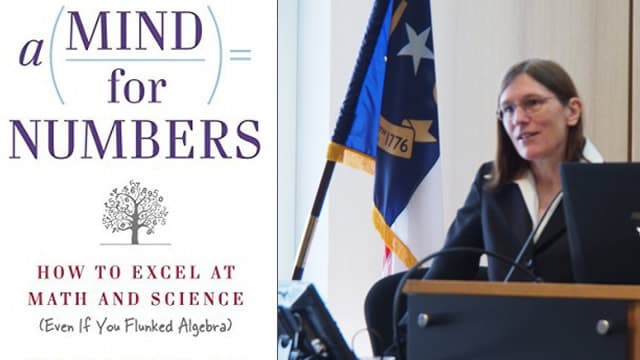
Math and science classes have long been the stuff of nightmares for many, but there is a movement under way to change that perception.
UNC Charlotte’s College of Education recently hosted one of the faces of that movement – Oakland University engineering professor Barbara Oakley, author of “A Mind for Numbers.” Her research delves into the neuroscience of learning in an approachable way. It explores topics ranging from the specific ways the brains focuses, to why people procrastinate and how to stop.
“There are so many people who can do math and science, but who just haven’t been taught how to learn. It’s simply amazing to me — almost everyone goes through 12 to 16 years of education in this country without taking a single course in how to learn effectively,” Oakley said.
Alicia Wickliff, UNC Charlotte Center for STEM Education associate director, helped organize Oakley’s visit. She said Oakley’s work exposes a common misunderstanding about student evaluation.
“Success in the schools in general has been understood but really associated with individual effort and intelligence not necessarily a formula for how to best use brain function to achieve learning,” she said.
Shifting priorities in the skills employers desire make Oakley’s research particularly timely.
“The world is changing. Easy familiarity with math, science and technology is becoming as important as knowing how to read. Sadly, high school and college students in non-STEM areas often don’t understand this. They end up being surprised when they try to join the working world,” she said.
“We’re always told to follow our passion. This is simplistic and not very realistic advice—if I followed my passion, I’d be sitting on the beach in Cancún with a glass of wine in my hand. I don’t see too many job descriptions for ‘Cancún wine sipper.’”
The reality is that passions develop about what we’re good at. But some areas, like STEM, often take longer to get good at. Much better than following your passion is to work to broaden your passion. STEM can take longer to get good at, but when you give it time, it can turn out to be amazingly enriching and can open terrific career doors.”
UNC Charlotte’s Center for STEM Education (CSTEM) is on a mission to keep those doors open for students, both by directly offering opportunities to K-12 students and by providing future science and math instructors a strong education. CSTEM has partnered with the Charlotte Area Science Network for more than a decade to promote a regional vision for STEM education.
Like the College of Education as a whole, CSTEM also embraces its relationship with Charlotte-Mecklenburg Schools. It’s a connection that CMS school board candidate Jeremy Stephenson, who attended Oakley’s on-campus talk, recognizes.
“CMS and UNC Charlotte are inseparable; of 10,000 CMS teachers, more than 1,800 are UNC Charlotte alumni. In the push for continuous improvement, the College of Education will play a key role,” he said.
Looking at the numbers, it’s clear there is work yet to be done. CMS Superintendent Ann Clark has noted that North Carolina’s public universities graduated one physics teacher in 2011. That same year, only around a third of American eighth graders were proficient in math and science, according to the National Math and Science Initiative.
As troubling as those statistics may be, Oakley’s approach dismisses the idea that they reflect an enduring standard.
Setting a new standard for STEM education and the training of STEM educators in the Charlotte community and beyond remains a principal focus at the College of Education.